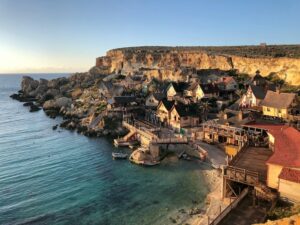Malta citizenship by residency offers individuals a unique opportunity to become citizens of a beautiful Mediterranean island nation. Malta introduced its citizenship by residency program to diversify its population and boost its economy.
Over the years, many have chosen Malta citizenship by residency for its numerous benefits, making it a popular choice among global citizens. Unlike the Citizenship by Investment program, Malta citizenship by residency focuses on the duration of an individual’s stay in the country.
Historically, Malta introduced this program to attract global talents and investors, ensuring a diverse and thriving community. The Malta Citizenship by Naturalization for Exceptional Services by Direct Investment program (CES) is the current pathway for individuals seeking Malta citizenship by residency.
This program expedites the process of naturalization through foreign investment, extending beyond the offerings of the Malta Investor Visa. Successful applicants gain full Maltese citizenship and a European passport, provided they meet the investment and eligibility requirements.
If you want to invest as an expat or high-net-worth individual, you can email me (advice@adamfayed.com) or use these contact options.
Benefits of Acquiring Malta Citizenship by Residency
Getting citizenship by residency in Malta presents many benefits. Here are some of them:
Lifestyle and Living Standards
Malta citizenship by residency offers a high standard of living. The island boasts a rich history, vibrant culture, and stunning landscapes.
As a European country located in the central Mediterranean archipelago, Malta allows its citizens to move to Malta anytime. The country enjoys about 300 sunny days a year, making it a haven for outdoor enthusiasts.
Activities such as diving, fishing, and surfing are popular among residents and tourists. Moreover, English is an official language in Malta, eliminating language barriers and facilitating easy communication with locals.
Quality of life in Malta
Choosing Malta citizenship by residency means embracing a Mediterranean lifestyle. The country ensures a safe environment for families; its warm climate is a significant attraction.
Maltese citizens can enter the country even if its borders are closed to foreigners, providing security during global uncertainties.

Education and healthcare facilities
Malta citizenship by residency guarantees access to top-tier education and healthcare facilities. The country’s education system aligns with the Bologna system, ensuring that diplomas from Maltese universities are recognized in Europe and the USA.
Furthermore, Malta’s healthcare system meets EU standards, offering a wide range of medical services in state hospitals. In 2017, Malta ranked 9th globally by The Lancet, a leading medical journal, highlighting its commitment to healthcare excellence.
Economic Advantages
Malta citizenship by residency presents a plethora of economic benefits. The country’s strategic location in the Mediterranean makes it a hub for business and trade.
Tax benefits and incentives
Malta citizenship by residency provides attractive tax incentives. The Maltese tax system is designed to encourage business growth and personal wealth accumulation.
There are no taxes on wealth, and the annual real estate tax is non-existent. In some cases, like when a child inherits their parent’s residence, inheritance tax may not apply.
Furthermore, shareholders of Maltese companies can reclaim up to 100% of the corporate tax, making it a lucrative option for business owners.
Business-friendly environment
Entrepreneurs and business owners find Malta citizenship by residency particularly appealing. The country’s policies support both startups and established businesses.
Malta’s membership in the EU also facilitates business operations within the union, allowing Maltese citizens to open companies in any EU state. This especially benefits those looking to expand their business to the international market.
Travel Perks
One of the standout advantages of Malta citizenship by residency is the travel benefits it offers.
Visa-free travel within the Schengen Area
Malta citizenship by residency grants visa-free travel within the Schengen Area. This privilege ensures seamless travel across Europe, enhancing global mobility.
Additionally, Maltese citizens can enter the EU and Schengen countries without visas and extend their stay beyond 90 days, subject to individual country regulations.
Global mobility and international relations
Holding Malta citizenship by residency enhances global mobility. The Maltese passport allows visa-free travel to 187 countries, including major destinations like the US, UK, Canada, Australia, and Singapore.
This extensive travel access strengthens international relations and provides business and leisure travel opportunities.

Eligibility Criteria for Malta Citizenship by Residency
Gaining Malta citizenship by residency is an attractive proposition for many, given Malta’s strategic location, excellent air links, and high quality of life.
However, to be eligible for this prestigious status, there are specific criteria that applicants must meet.
Residency Duration Requirements
Malta citizenship by residency emphasizes the importance of an applicant’s physical presence in the country.
Minimum stay duration
To be eligible for Malta citizenship by residency, applicants must demonstrate their commitment by residing in Malta for a specific period.
According to the Maltese Citizenship Act Cap. 188, LN437 of 2020, applicants and all adult dependents must hold Maltese residence status for at least 36 months. However, this duration can be reduced to 12 months in exceptional cases.
Continuous residency vs. intermittent stays
While Malta citizenship by residency primarily focuses on continuous residence, certain provisions might allow intermittent stays to count towards the required duration. It’s essential to consult with legal experts to understand the nuances of these provisions.
Financial Commitments
Financial commitment is a significant aspect of the Malta citizenship by residency program, ensuring applicants contribute to the nation’s economic development.
Real estate investments or rentals
One of the primary financial requirements for Malta citizenship by residency is related to real estate.
Applicants must either purchase a residential property in Malta valued at least EUR 700,000 and hold it for five years or lease a residential property with a rental value of at least EUR 16,000 per annum for the same duration.
It’s worth noting that during these five years, subletting the property is not allowed.
Monetary contributions to the national fund
In addition to real estate commitments, applicants must significantly contribute to Malta’s national fund. The exact amount varies based on the residency duration chosen: EUR 600,000 for a 36-month residency or EUR 750,000 for a 12-month residency.
Due Diligence and Background Checks
Ensuring the integrity of the Malta citizenship by residency program is paramount. Hence, thorough background checks are conducted on all applicants.
Importance of a clean criminal record
Having a clean criminal record is non-negotiable for Malta citizenship by residency. The Maltese government conducts rigorous checks to ensure that applicants have no criminal history that might threaten the nation.
Financial and health checks
Apart from criminal background checks, applicants undergo financial and health assessments. These checks ensure they are in good financial standing and health, aligning with the standards set for Malta citizenship by residency.

Application Process and Timeline
Gaining Malta citizenship by residency is a coveted achievement for many, given the country’s strategic location, rich history, and membership in the European Union.
The application process, while straightforward, requires meticulous attention to detail and adherence to specific guidelines.
Step-by-step Guide to Application
The Malta citizenship by residency application process is straightforward, but it’s essential to follow each step diligently to ensure a successful outcome.
Gathering necessary documentation
Before you even consider applying for Malta citizenship by residency, you must have all the required documents. These typically include:
- Proof of residency: This can be a rental agreement or utility bills showing your address in Malta.
- Financial documentation: This might include bank statements, tax returns, or proof of investment in Malta.
- Personal identification: If applicable, a valid passport, birth certificate, and possibly marriage or divorce certificates.
- Health insurance: Proof that you’re covered for any health-related expenses during your stay in Malta.
Submitting the application
With all documents in hand, you can submit your Malta citizenship by residency application. It’s crucial to fill out the application form accurately and provide all requested information. Any discrepancies or missing information can lead to delays or even rejection.
Attending interviews and assessments
Not all applicants will need to attend an interview. However, if the Maltese authorities request it, you should be prepared to discuss your reasons for seeking Malta citizenship by residency and demonstrate your commitment. The assessment might also delve into your financial stability and ties to Malta.
Expected Duration and Waiting Period
The anticipation after submitting your Malta citizenship by residency application can be nerve-wracking. Understanding the timeline can help set realistic expectations.
Average processing time
While the exact time can vary, most Malta citizenship by residency applications take a few months to process. It’s essential to remain patient during this period and be ready to provide any additional information if the authorities request it.
Factors affecting the timeline
Several factors can influence the processing time for Malta citizenship by residency:
- Volume of applications: Periods of high demand can lead to longer wait times.
- Completeness of your application: If you’ve provided all the necessary information and documentation, your application will likely be processed faster.
- External checks: The Maltese authorities may need additional background checks, which can add to the processing time.
Potential Challenges and How to Overcome Them
Navigating the path to Malta citizenship by residency can be intricate, with various potential pitfalls. However, you can sidestep these challenges and ensure a smooth application process with the right guidance and understanding.
Common Mistakes in the Application Process
Applying for Malta citizenship by residency can be challenging, but awareness of common mistakes helps.
Incomplete documentation
One of the most frequent mistakes applicants make is not providing all the necessary documents. Ensure you provide all required documents when applying for Malta citizenship by residency. It’s crucial to double-check the list of required documents and ensure that each one is up-to-date and valid.
Misrepresentation of facts
Honesty is paramount when applying for Malta citizenship by residency. Always be truthful in your Malta citizenship by residency application to avoid complications. Misrepresenting facts or providing false information can lead to immediate disqualification and potential legal consequences.
Legal and Financial Impediments
Some applicants face legal or financial hurdles, complicating the application process.
Addressing previous financial discrepancies
Before applying for Malta citizenship by residency, it’s essential to clear any financial discrepancies. This includes settling outstanding debts, resolving tax issues, or clarifying financial irregularities. Ensure that your financial records are transparent, as the Maltese authorities will conduct thorough financial chec

Ensuring compliance with Maltese laws
Compliance with local laws is non-negotiable. Always adhere to Maltese regulations and standards to maintain your Malta citizenship by residency status. This includes understanding tax obligations, property regulations, and any other legal requirements pertinent to residents.
Misconceptions Surrounding Rejections
As more high-net-worth individuals consider Malta citizenship, misconceptions arise regarding the application’s ease or difficulty.
It’s essential to understand that the Individual Investor Programme (IIP) is selective, rejecting one in four applications. However, rejection doesn’t necessarily imply a shady character. For instance:
Health Issues
Applicants or dependents with serious or contagious health conditions might face rejection. The Maltese authorities aim to ensure that individuals don’t become a burden on the Maltese healthcare system.
Inability to present requisite documents
Some investors might fail to provide essential documents. The application might face rejection if suitable alternatives or justifications aren’t provided.
Reputation and Media Attention
Successful business families sometimes face adverse media attention due to their wealth. Negative press, even if baseless, can impact the outcome of an IIP application.
Political Factors
Being a politically exposed person (PEP) requires close examination. The application might face rejection if the political exposure negatively impacts Malta’s national security or public policy.
Ensuring Success in the Application Process
To increase the chances of a successful application for Malta citizenship by residency:
- Work with a specialist law firm: This ensures confidentiality, especially with lawyer-client privilege.
- Inquire about data security standards: Ensure your chosen firm uses robust security measures to protect client data.
- Provide a complete picture: Give your lawyers all relevant facts to ensure a successful application.
- Request an enhanced assessment: If standard due diligence indicates potential issues, ask for enhanced due diligence research to maximize your chances of success.
Comparing Malta Citizenship by Residency with Other European Programs
Europe offers many residency and citizenship programs, each with unique benefits and requirements. Malta citizenship by residency stands out for its comprehensive benefits and streamlined process.
Malta vs. Portugal’s Golden Visa
Malta citizenship by residency and Portugal’s Golden Visa differ significantly in their investment requirements. While Malta emphasizes a longer residency duration, Portugal’s Golden Visa primarily focuses on financial investments.
For instance, Malta’s program requires applicants to significantly contribute to the Maltese Government, which varies based on the applicant’s family size and other factors. On the other hand, Portugal’s Golden Visa often centers around real estate investments or capital transfers to Portuguese entities.
Residency Obligations
Malta citizenship by residency strongly emphasizes continuous residency in the country. In contrast, Portugal’s Golden Visa offers more flexibility, allowing intermittent stays that meet the residency requirement cumulatively.
This flexibility makes Portugal’s program appealing to those who cannot commit to continuous stays in the country.
Malta vs. Spain’s Residency by Investment
The application process for Malta citizenship by residency is often more streamlined than Spain’s Residency by Investment program.
Malta introduced its programs, including the Malta Permanent Residence Programme and the 2014 Malta Citizenship by Investment, to attract high-net-worth individuals, offering them a faster route to Maltese residency or citizenship.
The estimated processing time for Malta’s permanent residence application is approximately four to six months while obtaining Maltese citizenship can take as little as 1-2 months after satisfying the minimum residency period.
In contrast, Spain’s program might involve a more extended application process, depending on individual circumstances.
Benefits and Incentives
Both Malta and Spain offer a range of benefits to successful applicants. However, Malta citizenship by residency provides some unique advantages.
Successful applicants of Malta’s programs can enjoy free movement within the European Union, visa-free access to over 172 countries, including major destinations like the US, UK, and Canada, and other rights accorded to Maltese and European citizens.
Spain’s Residency by Investment program also offers mobility within the Schengen Area and other benefits, but Malta’s program stands out for its comprehensive economic incentives and broader global mobility.
Eligibility and Due Diligence
Both Malta and Spain have stringent eligibility criteria to ensure the integrity of their programs. Applicants for Malta citizenship by residency undergo a thorough due diligence process, ensuring they are of good conduct and standing.
They must also provide police certificates from their country of origin and any country where they’ve resided for over six months in the past ten years. Spain’s program also emphasizes due diligence, focusing on financial stability and a clean criminal record.
Is Malta Citizenship by Residency Right for You?
Malta citizenship by residency is an attractive option for many international investors. This program provides a pathway to European Union citizenship, granting the right to live, work, or study in any EU country. However, like any significant decision, weighing the pros and cons is crucial.
Personal, financial, and long-term considerations
Before diving into the Malta citizenship by residency program, evaluating your long-term goals and financial situation is essential. Malta offers a stable political climate, a robust economy, and a high standard of living.
Moreover, Malta’s strategic location at the crossroads of Europe, Africa, and Asia makes it an attractive financial center. But, it’s essential to understand the financial commitments involved.
For instance, the main applicant is required to make an Exceptional Direct Investment, a philanthropic donation, and establish a residence in Malta, either by purchasing real estate or renting.

Seeking Expert Advice
When considering Malta citizenship by residency, seeking expert advice is imperative. The process involves intricate legal and financial steps, and expert guidance can ensure a smooth experience.
Expert advice from government-licensed immigration attorneys and financial advisors can guide you through every step. These professionals can assist with document preparation, liaise with government authorities on your behalf, and provide pre-immigration legal and tax advice.
Moreover, they can help with the Malta real estate purchase process, international tax planning, and other related services.
Pained by financial indecision?

Adam is an internationally recognised author on financial matters with over 830million answer views on Quora, a widely sold book on Amazon, and a contributor on Forbes.



